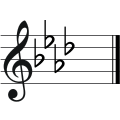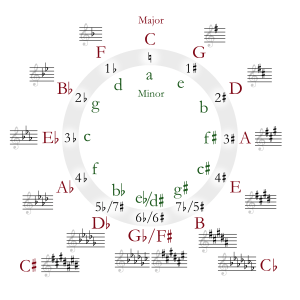A-flat major facts for kids
 |
||
| Relative key | F minor | |
|---|---|---|
| Parallel key | A♭ minor | |
| Notes in this scale | ||
| A♭, B♭, C, D♭, E♭, F, G, A♭ | ||
A-flat major is a major scale that starts on the musical note A-flat. A major scale is a series of eight notes played in a specific order. It often sounds bright and happy.
The relative minor of A-flat major is F minor. Its parallel minor is A-flat minor. Think of these as musical cousins that share some of the same notes.
Contents
What is A-flat Major?
A-flat major is known for its peaceful and calm sound. Many famous composers have used this key in their music. It can create a feeling of warmth and gentleness.
Composers and A-flat Major
Franz Schubert often used A-flat major in his pieces. He liked its gentle and expressive qualities.
Frédéric Chopin wrote more piano pieces in A-flat major than in any other key. Twenty-four of his works use this key. This shows how much he loved its sound.
Charles-Marie Widor, a French organist and composer, thought A-flat major was one of the best keys for flute music.
A-flat Major in Orchestras
Ludwig van Beethoven often chose A-flat major for the slow parts of his C minor symphonies. These slow movements often provide a calm contrast to the faster, more intense parts.
Other composers like Antonín Dvořák and Anton Bruckner also followed this idea. They used A-flat major for slow movements in their C minor symphonies.
In the past, tuning timpani (large drums) was a manual process. If a piece changed keys, it took time to retune the drums. For example, in Beethoven's Symphony No. 5, the timpani stayed tuned to C and G. This was because there wasn't enough time to retune them for the slow movement in A-flat major. However, in Bruckner's Symphony No. 1, the timpani were retuned.
Edward Elgar's Symphony No. 1 in A-flat major is a very famous symphony in this key. Arnold Bax also wrote his last symphony in A-flat major.
Domenico Scarlatti used A-flat major in only two of his many keyboard sonatas. These were K. 127 and K. 130. This key has the most "flats" (notes lowered by a half-step) that he used.
Both Felix Mendelssohn and John Field each wrote one piano concerto in A-flat major.
Scales and keys
| Diatonic Scales and Keys | |||||||||||||||||||||||||||||||||||||||||||||||||||||||
|---|---|---|---|---|---|---|---|---|---|---|---|---|---|---|---|---|---|---|---|---|---|---|---|---|---|---|---|---|---|---|---|---|---|---|---|---|---|---|---|---|---|---|---|---|---|---|---|---|---|---|---|---|---|---|---|
|
|||||||||||||||||||||||||||||||||||||||||||||||||||||||
| The table shows the number of sharps or flats in each scale. Minor scales are written in lower case. | |||||||||||||||||||||||||||||||||||||||||||||||||||||||
See also
 In Spanish: La bemol mayor para niños
In Spanish: La bemol mayor para niños
 | Anna J. Cooper |
 | Mary McLeod Bethune |
 | Lillie Mae Bradford |


